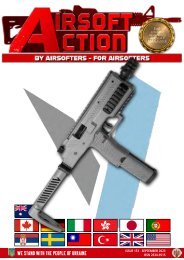PMCI - October 2014
Slightly later than planned due to operational commitments, the second issue of PMCI is now available. Steve Barret writes about his 1st-hand experience of the Taliban's attack on his compound in Kabul, while Columbia-based security expert, Ban Hockman, points out some of the dangers faced while travelling in unknown locations. There's loads of reviews on everything from footwear to computers and we get to Meet the Manufacturer, Snugpack. As always, PMCI is FREE to the reader. We hope you enjoy this issue - wherever you are in the World!
Slightly later than planned due to operational commitments, the second issue of PMCI is now available.
Steve Barret writes about his 1st-hand experience of the Taliban's attack on his compound in Kabul, while Columbia-based security expert, Ban Hockman, points out some of the dangers faced while travelling in unknown locations.
There's loads of reviews on everything from footwear to computers and we get to Meet the Manufacturer, Snugpack.
As always, PMCI is FREE to the reader.
We hope you enjoy this issue - wherever you are in the World!
You also want an ePaper? Increase the reach of your titles
YUMPU automatically turns print PDFs into web optimized ePapers that Google loves.
If you are travelling with<br />
a Security Detail, will they understand<br />
the operating environment<br />
at your destination and act<br />
within it? You have every right<br />
to challenge every single one of<br />
their assumptions, until you are<br />
happy with their approach.<br />
A businessman friend of<br />
mine recently travelled to Lagos<br />
and after shopping around,<br />
he eschewed the high-profile<br />
(and expensive) armed police,<br />
screaming-siren escort usually<br />
offered to visiting executives<br />
and opted instead for a single expat<br />
Nigerian, who lived outside<br />
the country but knew<br />
the operating environment<br />
perfectly.<br />
The guy was not allowed<br />
by local law<br />
to carry a weapon<br />
but compensated for<br />
this with a low-key<br />
approach and ability<br />
to sniff out trouble<br />
before it happened.<br />
A pre-trip planning<br />
meeting in Europe,<br />
to run through all<br />
routes and meeting<br />
locations so that they<br />
could be reconnoitred<br />
in advance, gave<br />
added confidence to the client<br />
during the operation and the individual<br />
gained his trust quicker<br />
than a local operator would have<br />
done if he had only been meeting<br />
them for the first time on getting<br />
off the plane.<br />
Establish primary, secondary<br />
and tertiary routes wherever<br />
possible for all ground transportation<br />
during your visit (on<br />
one operation in the US I had<br />
to rely on a sixth choice evacuation<br />
route!). Ensure that any<br />
particular security hotspots and<br />
support points, such as Hospitals<br />
and Police Stations, have been<br />
identified in advance on all your routes. Finally, don’t be so naïve as to think that a<br />
Security Detail will solve all your problems and that you can switch off. One of the<br />
major findings to come out of Statoil’s investigation into the In Amenas Refinery<br />
attack in Algeria, was the asset’s over-reliance on local military and not enough<br />
attention paid to strong management processes and systems, training within the<br />
company and intelligence-sharing with other international bodies.<br />
Communications<br />
Efficient communications are not only vital during the planning and realisation<br />
of any trip but also in your ability to respond effectively in the event of an emergency.<br />
Calling for help is arguably the single most important thing you can do in a crisis;<br />
newspapers love stories of family members being able to effect dramatic rescues of<br />
loved ones, once notified of their distress by Facebook, Twitter or SMS from a remote<br />
location. On the flip side, when communications fail the results can be disastrous.<br />
Following a shooting spree at Los Angeles International Airport in late 2013,<br />
what hindered first responders<br />
was not knowing which<br />
Efficient communications are not<br />
only vital during the planning and<br />
realisation of any trip but also in<br />
your ability to respond effectively<br />
in the event of an emergency.<br />
Calling for help is arguably the<br />
single most important thing you<br />
can do in a crisis.<br />
Terminal the firing was coming<br />
from. The phone system<br />
and some panic buttons inside<br />
Terminal 3 were not<br />
working properly and the<br />
first call to airport police was<br />
not completed because the<br />
caller ran for safety before<br />
they could say exactly where<br />
they were (and the phone<br />
system itself could not track<br />
where the call came from).<br />
Many of us will simply<br />
be relying on our cell phones<br />
but a spare, portable, fully<br />
charged phone is the least<br />
you might want to include. If you know your destination, identify any cell or other<br />
data black spots in the area you are visiting and make sure you have a backup plan<br />
if your cell phone fails to function effectively when you reach where you are going.<br />
Before you leave, establish agreed communication procedures with your office<br />
or your family back home. These do not need to be complicated – simply a promise<br />
to text or call at a prearranged time. Furthermore, brief them on what to do if they<br />
do not hear from you. Not always a nice conversation to have, but essential.<br />
In remote, high-risk locations, you will probably be using satellite communications<br />
rather than GPRS but you need to have a plan for what happens if your phone<br />
is taken off you. Make sure that whoever is sending you has the ability to continually<br />
track your whereabouts. A range of easily affordable, commercially-available and<br />
unobtrusive personal tracking devices are now on the market, enabling data to be sent<br />
over GPRS and satellite networks to trusted contacts. On one particularly risky job, I<br />
spent three days with a tracker wedged into a fairly intimate part of my anatomy. I´m<br />
sure its location didn´t facilitate the signal but it was the only option! I’m not saying<br />
that you should go that far but you could consider putting a small tracker into an item<br />
of clothing or luggage when working in or travelling to hostile environments.<br />
16


















